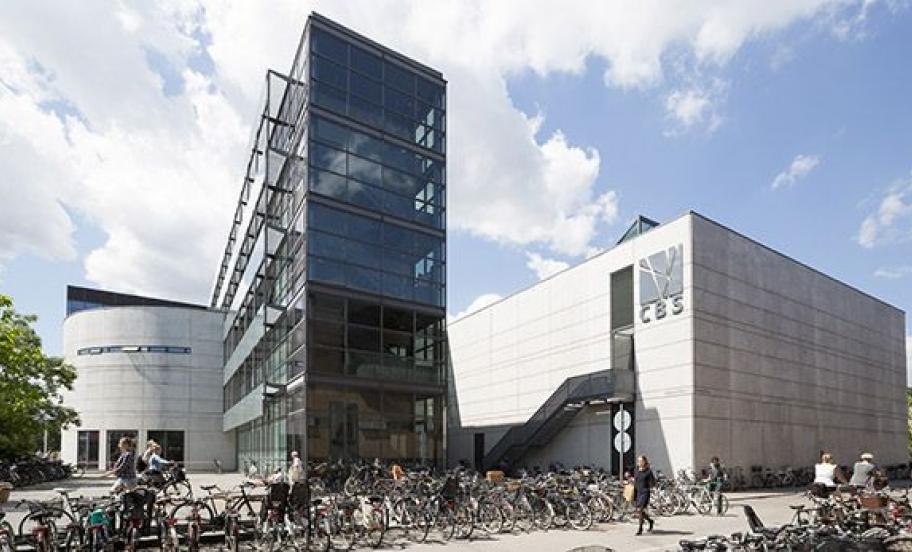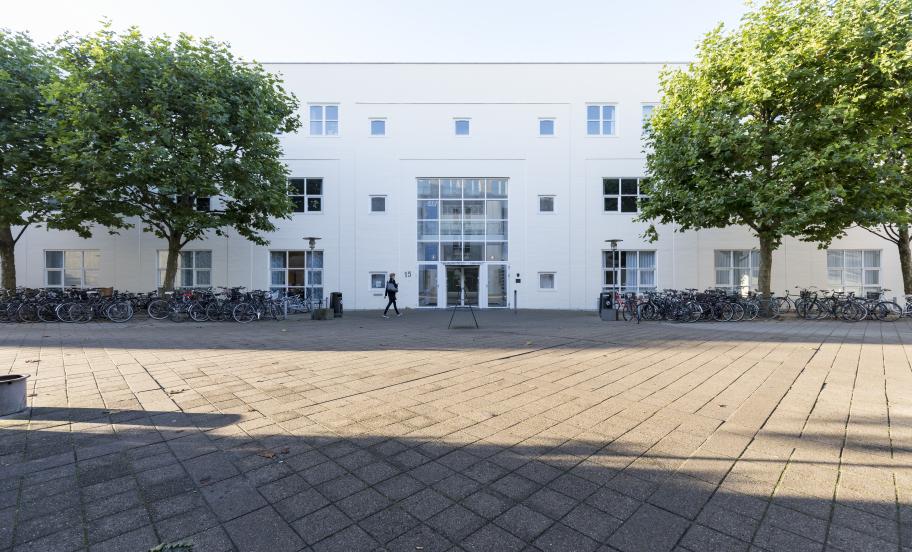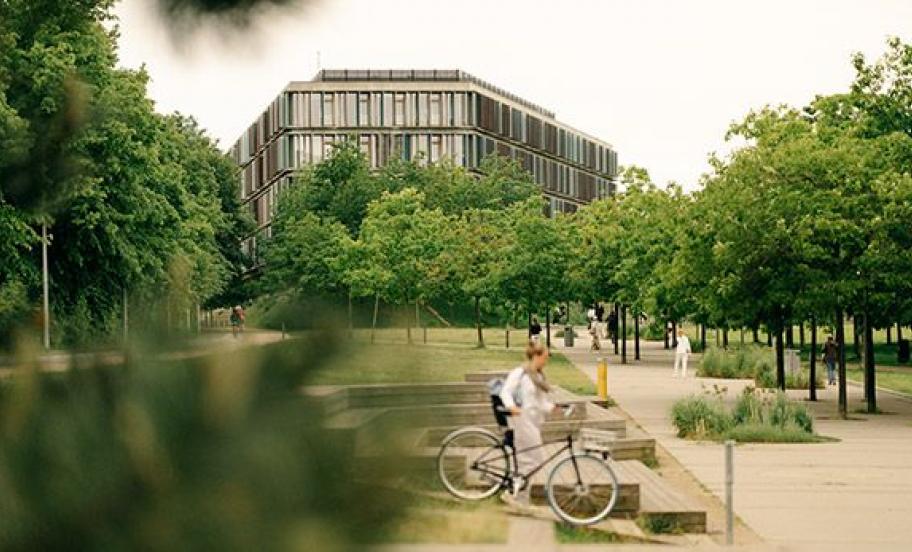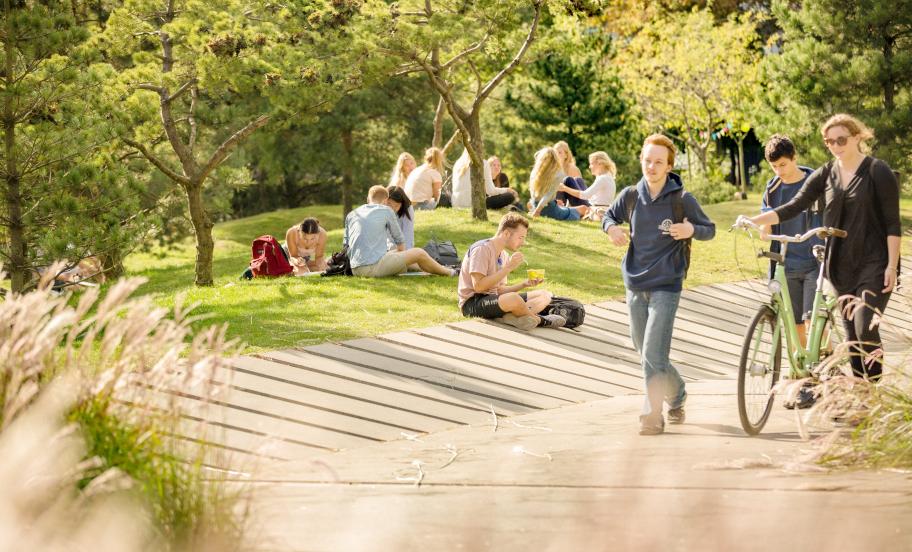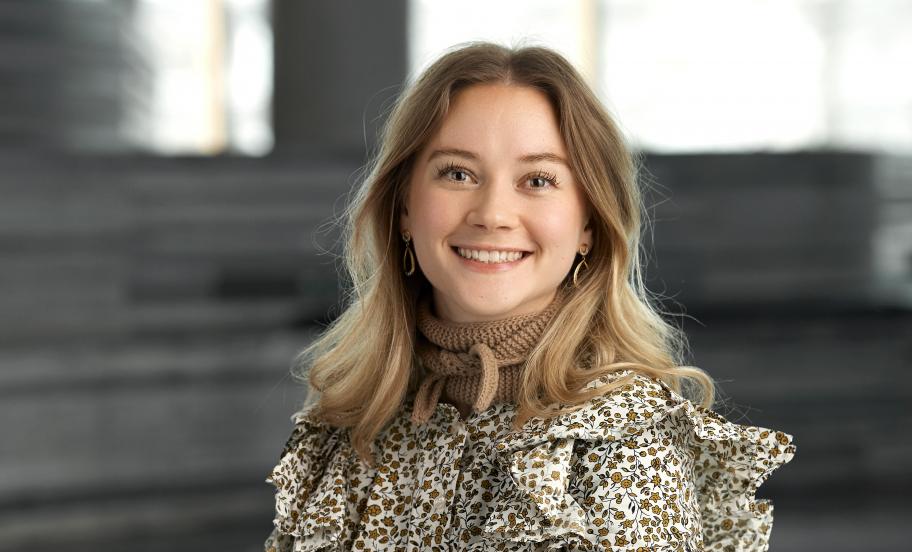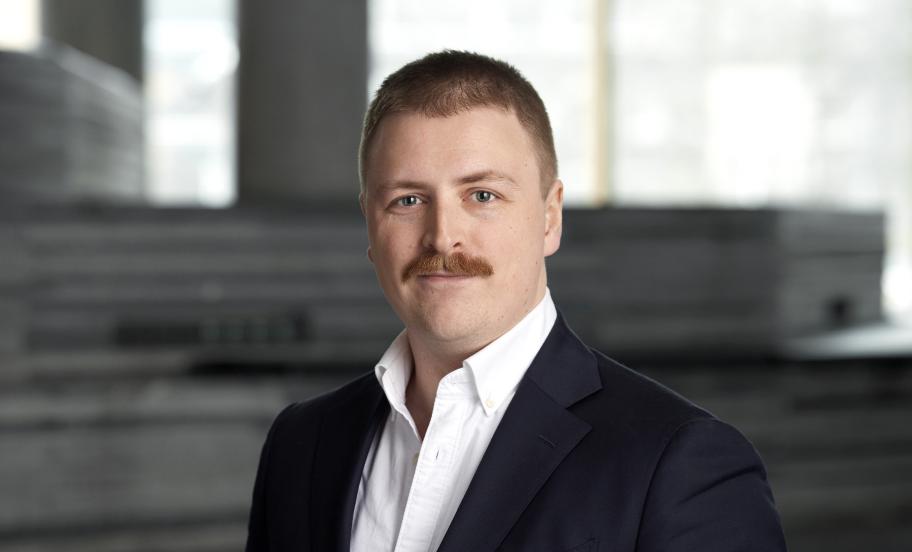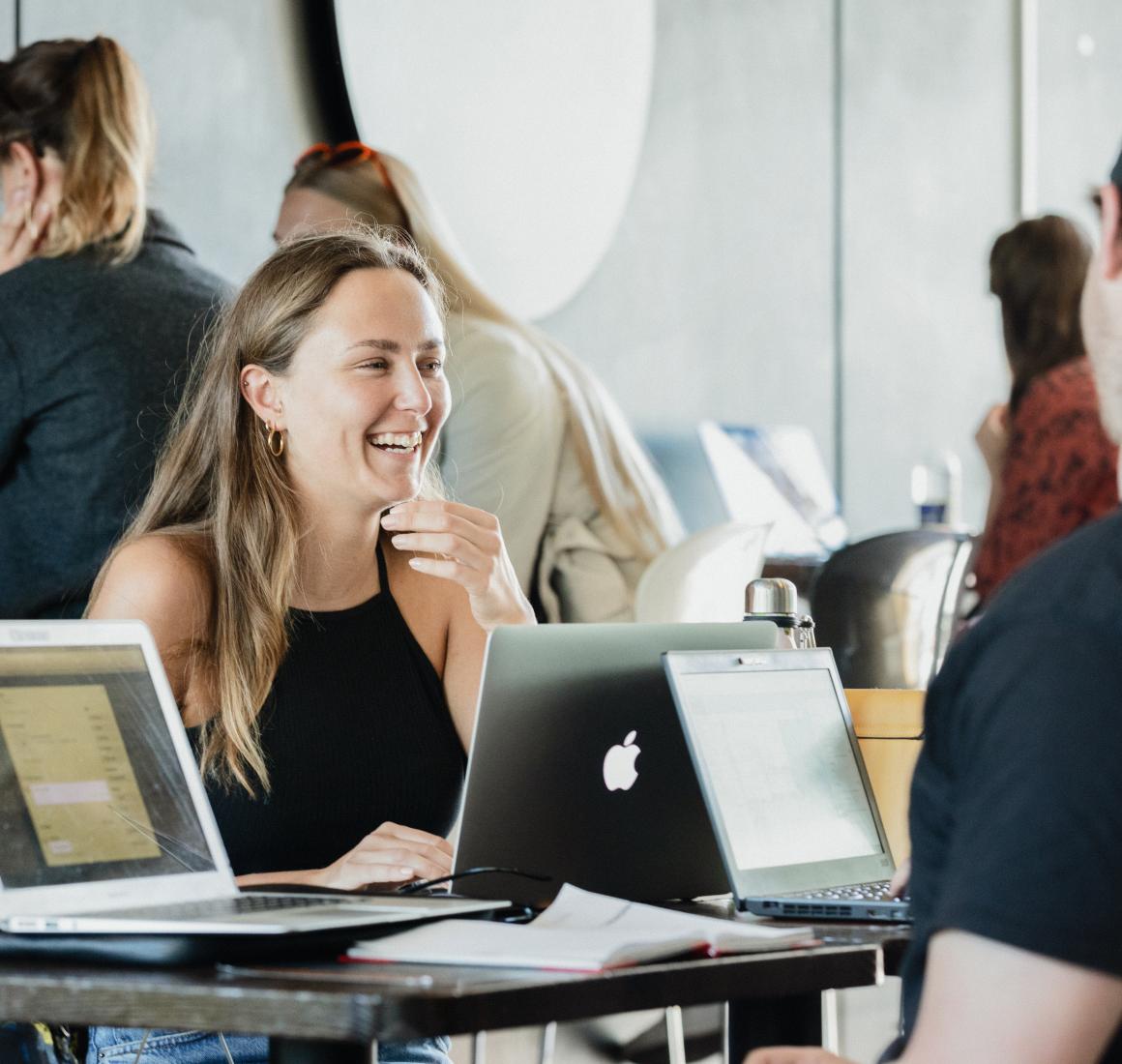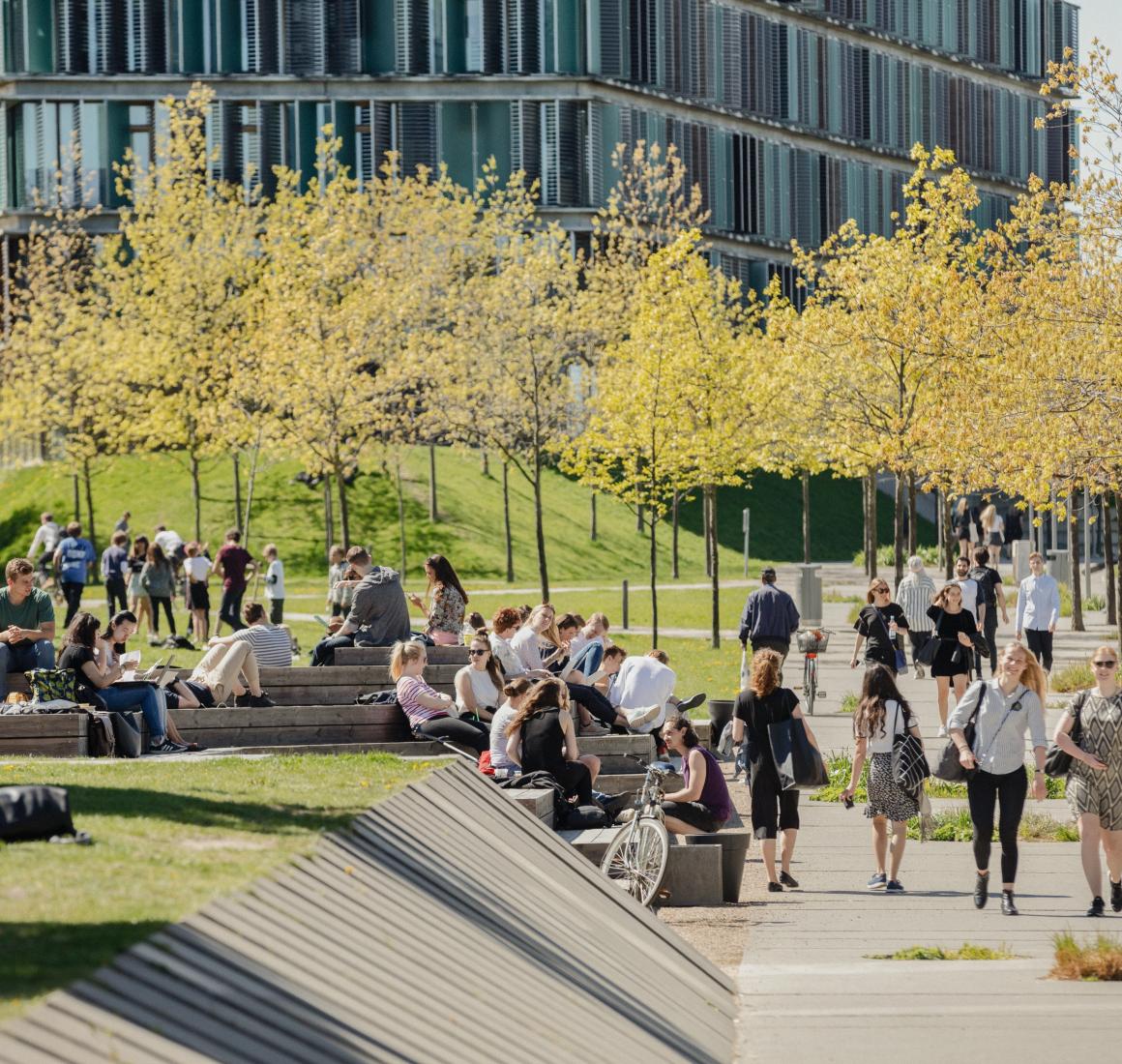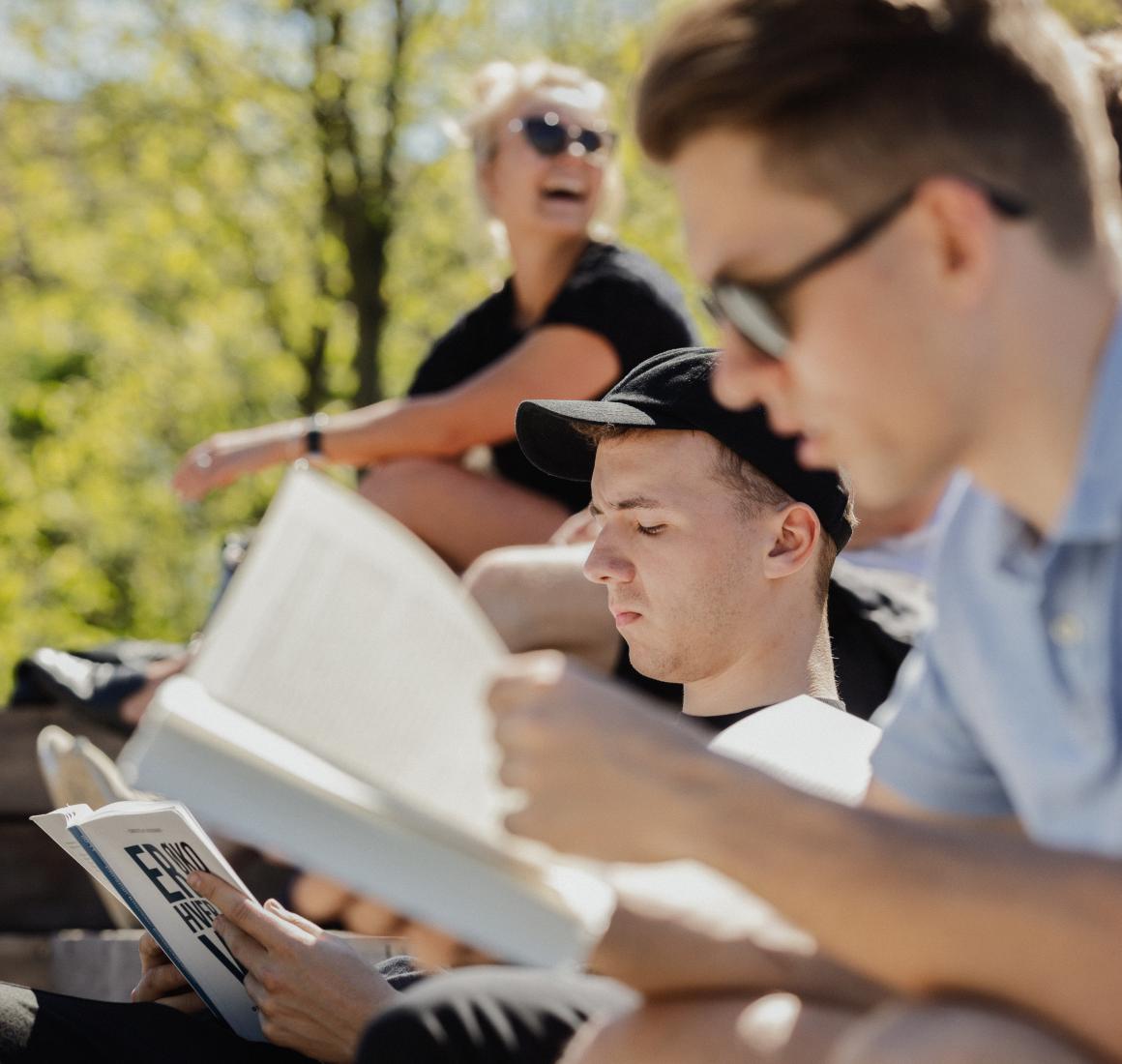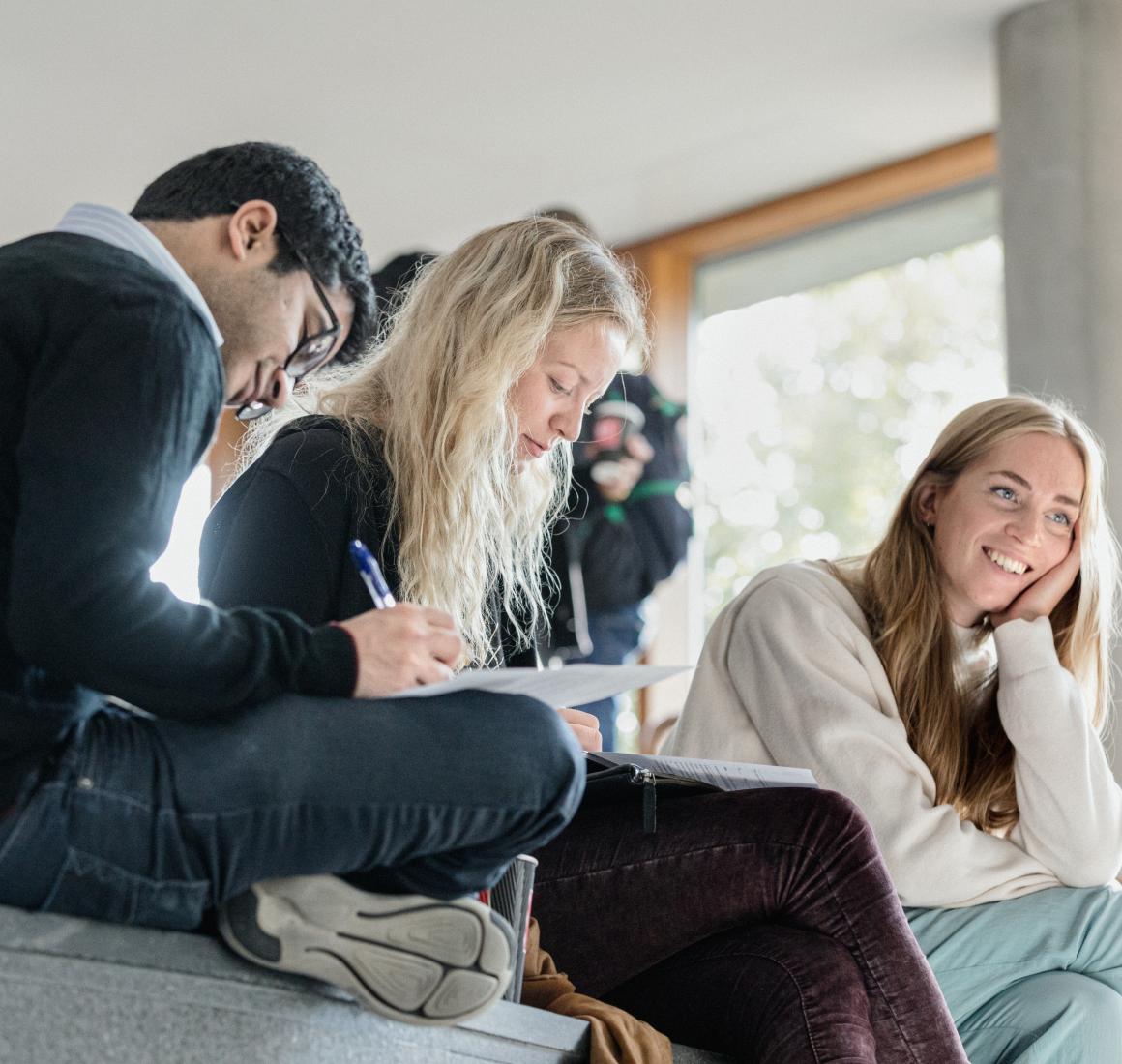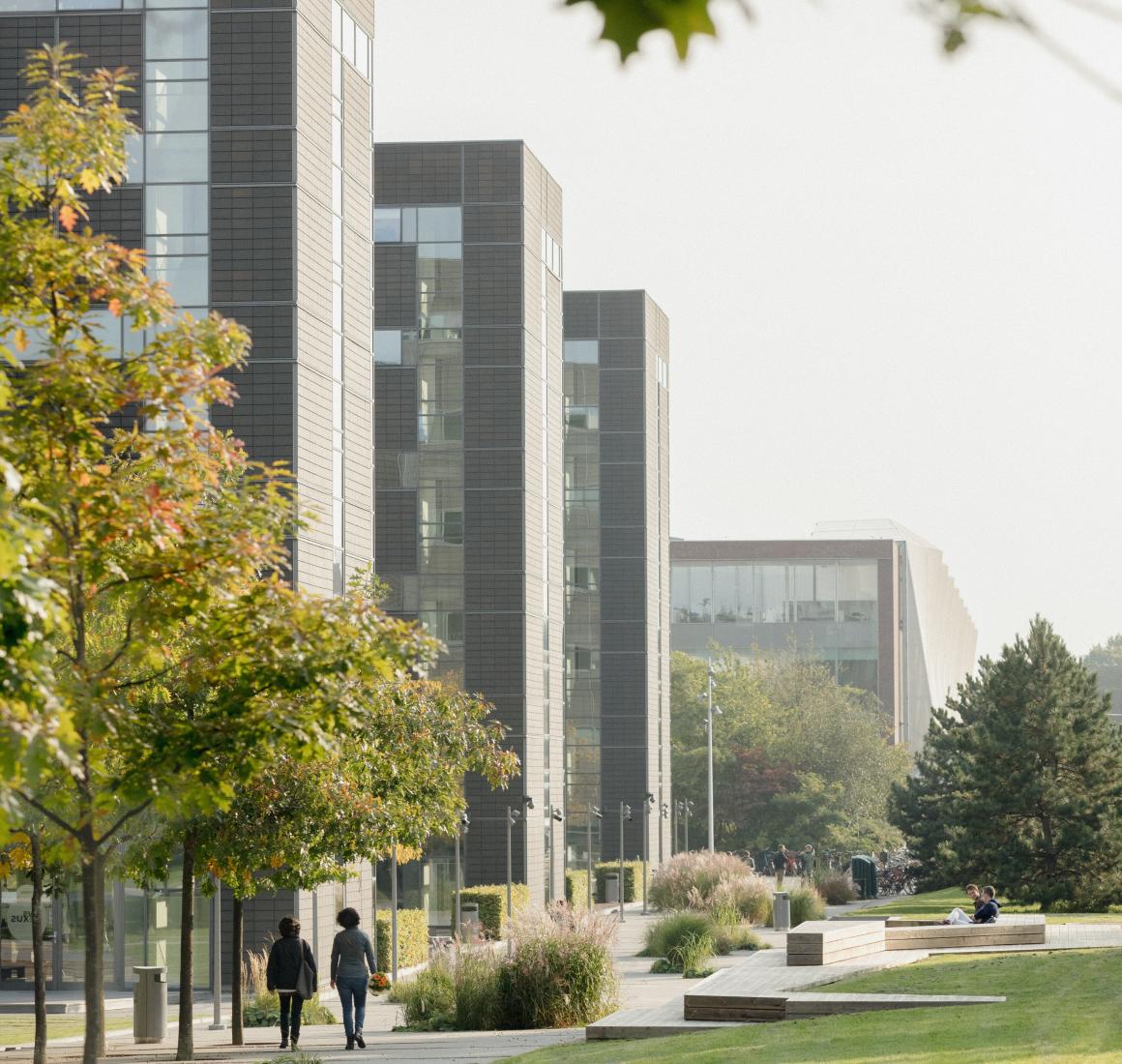MSc in Economics and Business Administration in Strategy, Organisation and Leadership
The MSc EBA SOL programme is about how strategy, organisation and leadership shape businesses and society. You’ll learn to see challenges from multiple perspectives, build strong analytical skills and prepare to lead and innovate in a world of constant change.
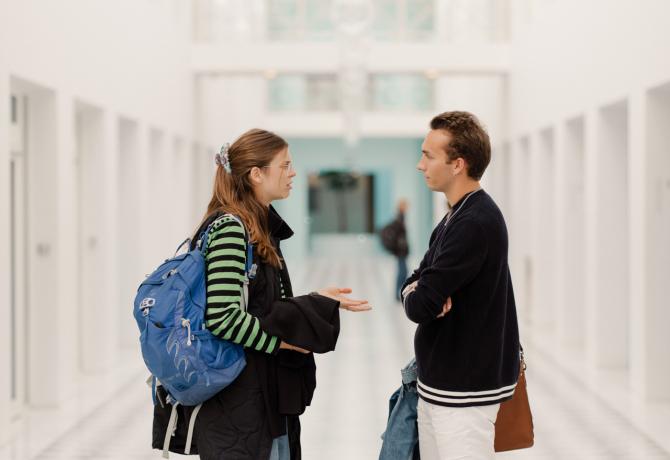
About MSc in Economics and Business Administration in Strategy, Organisation and Leadership
Why study MSc EBA SOL?
3 good reasons to choose MSc EBA SOL
Curiosity about organisations
Passion for big-picture thinking
Drive to tackle complex challenges
“ I chose to study SOL as it seemed like a programme that was able to offer great insight into the areas of strategy, organization and leadership. ” Anna
Student, MSc EBA SOL
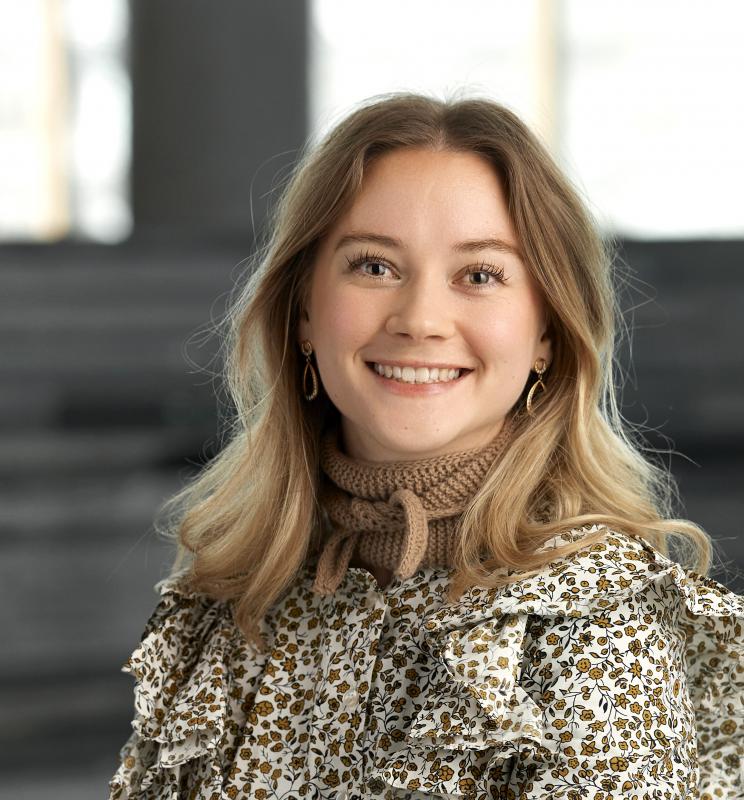
Programme description
Understand real-life challenges
The MSc in Strategy, Organisation and Leadership (SOL) explores how organisations function and change in a complex world. You will study advanced theories that help you understand real-life challenges in leadership and management.
Theory with practical relevance
You will not learn fixed tools or step-by-step models. Instead, you will gain insight into how different theories can be applied in practice, depending on the organisation, its culture, and its environment.
A holistic perspective
The programme teaches you to see organisations from multiple angles. You will learn that there is rarely one “right” answer to a problem—only different ways of understanding and acting in complex situations.
From individuals to society
You will explore how individual actions, group dynamics, and organisational decisions are connected to broader business strategies and societal developments.
“ “We discuss a lot in class and share our different perspectives, and that makes for a really holistic look on the topics we cover. I feel like I'm learning a way of thinking and approaching situations that I can apply to anything.” ” Albin
Student
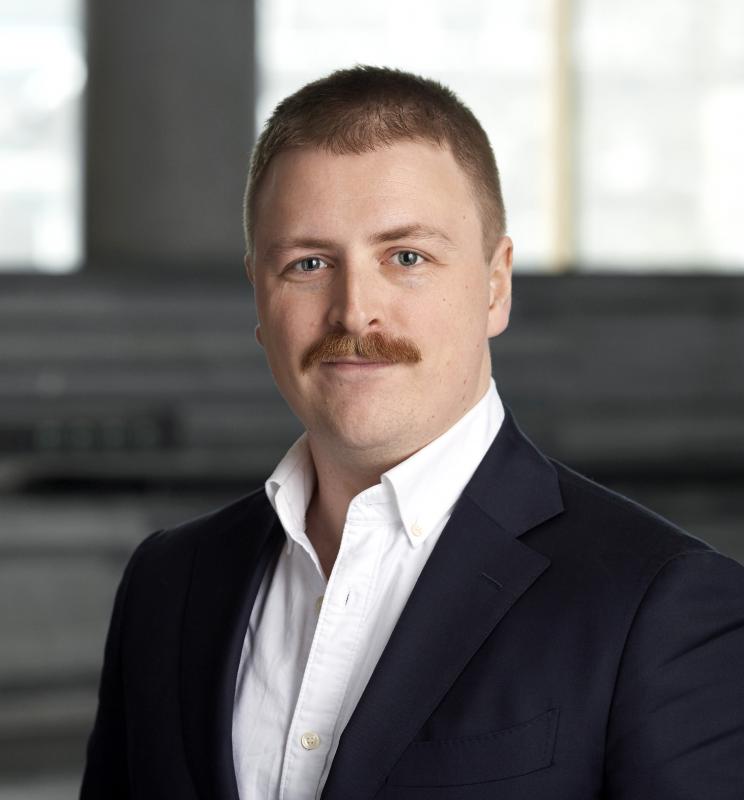
What you will work with
Throughout the programme, you will work with topics such as strategy, leadership, innovation, identity, ethics, and organisational change. You will analyse how these elements interact across individuals, teams, organisations, and society.
Developing analytical skills
You will learn to navigate uncertainty and complexity by developing strong analytical and critical thinking skills. This includes understanding how to frame problems, reflect on multiple perspectives, and make informed decisions in ambiguous situations.
Real-world relevance
The programme prepares you to address real-world challenges—such as how to lead change, mobilise resources, or manage innovation. You will learn how to apply theory to practice in ways that are sensitive to context and complexity.
A foundation for the future
With a deep understanding of organisations and leadership, you will be equipped to create value in both private and public sectors. You will be ready to collaborate across disciplines and contribute to sustainable development in a globalised world.
Open day for master programmes 2026
Are you considering a master programme at CBS? Come visit us for Open Day and hear about your opportunities .
Read more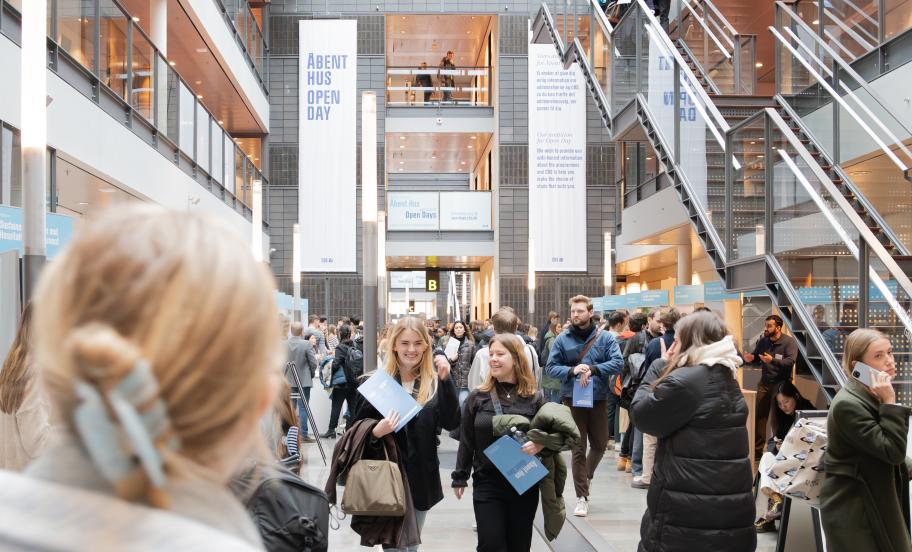
Info meetings about admission
Participate in the admission information meeting where we guide you through the application process and explain quota 1 and 2, language requirements and admission requirements.
Structure
Culture and society
You learn how culture, values, and social context influence organisations and leadership. Culture and society in MSc EBA SOL focus on understanding how diversity, globalisation, and institutions shape behaviour, communication, and decision-making in organisations.
Organisation and management
You learn how leadership, collaboration, and organisational design shape strategy and development. Organisation and management in MSc EBA SOL focus on leading people and organisations through change and on creating alignment between structure, culture, and performance.
3 things to consider
Programme overview
1st semester
2nd semester
3rd semester
4th semester
More about the programme
About the progression
Please not that the master’s level places greater emphasis on application. While some content is repeated from the bachelor’s, it ensures a shared foundation. The key difference is the faster transition from understanding concepts to applying them in practice.
Options
Electives
On the 3rd semester, you can choose to study courses of your specific interest. CBS offers a large number of electives within a wide range of topics. You can also choose to take electives at other Danish universities. The electives you choose have to be relevant for your programme.
See the current selection of CBS electives on Courses at master level.
Minor
On the 3rd semester, you can also choose to study a so-called minor. A minor is a package of electives within a specific academic area. Typically, it consists of 3 courses. By taking a minor, you strengthen your competences within a specific area of interest, and you can use it to qualify for specific jobs or industries.
See the current selection of CBS minors on Minors.
Exchange
Many students choose to go on exchange on their 3rd semester; usually at one of CBS’ more than 300 partner universities. When you go on exchange through CBS, you do not have to pay for the teaching at the foreign university (with a few exceptions), and you can bring your SU (student grant).
Find a list of all CBS partner universities here.
Academic internship
You can choose to replace some of your electives with a so-called academic internship. The academic internship consists of an internship period at a company, which is then completed with a project report. You can do the internship at a company in Denmark or abroad.
When doing an internship you get the opportunity to relate theory to practice and reflect on the academic training you receive at CBS in a practical setting. Therefore, the project report and work assignments during your internship have to be relevant to your study programme.
CEMS
On SOL, you can apply for the CEMS - Master in International Management programme. CEMS MIM is a double degree programme, which gives you the opportunity to add a second degree in international management to your CBS degree. This means that you will get both the MSc degree and the CEMS in International Management degree.
CEMS is a 1-year programme, which you study in combination with your CBS degree in your 3rd and 4th semester. Part of it takes place at one of the other CEMS universities abroad.
Learn more about CEMS / Master in International Management.
Master's thesis
Your 2nd year is completed with a master's thesis. You choose the topic you want to write about, which allows you to focus on a specific topic of your interest. Typically, you write your master's thesis with a fellow student.
Open day for master programmes 2026
Are you considering a master programme at CBS? Come visit us for Open Day and hear about your opportunities .
Read more
Study environment
An international network – in Denmark
At SOL you will team up with many students from diverse international and cultural backgrounds which make group and project work interesting and rewarding.
Expect to be active
The programme requires students to take on a lot of responsibility, think independently and to apply theory to practice, as courses involve working on a lot of empirical cases.
Meet the students
Student life at CBS
Being a CBS student is about more than going to lectures and doing exams.
Get a glimpse of student life at CBS. Here, you can explore what a typical day of teaching and exams looks like.
Also, you can learn how our programmes are structured and read about social life on campus, including the many ways to connect with fellow students.
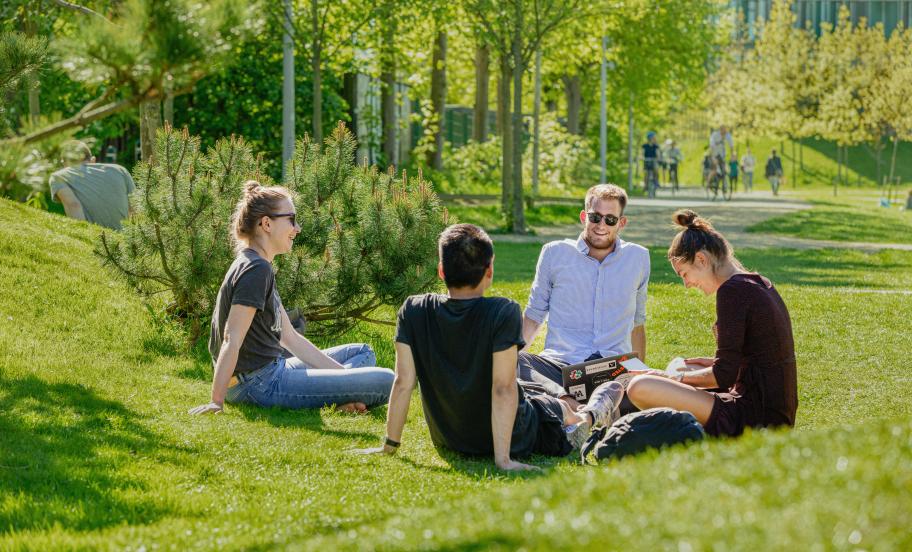
Teaching and exam
Lectures and exercise classes
The teaching consists of both lectures and interactive and dialogue-based classes.
Some courses have team-teaching where two teachers interact in the same session. In other classes teachers may use case studies, games and other exercises to improve the learning experience and make the best possible connection between theory and practice.
Read more about Teaching and working methods.
Written and oral exams
Several exams are written group projects based on studies carried out by the groups in actual companies in the Copenhagen area.
Some exams combine two courses to improve interdisciplinary learning and to prepare you for complex problem solving in real life. Some of the written exams will be followed by an individual oral exam, and some of the individual written exams are projects, essays and scientific papers.
Through the exams, you will learn to articulate complex issues, both orally and in writing. This is important both in preparation for your career and for your studies.
Read more about Exams.
Time consumption
Workload
You should know that it is demanding to study in a graduate programme, and both the curriculum and workload is significantly higher than at bachelor level.
If you are studying on a full-time graduate programme, you should expect spending approximately 37 hours on average on your studies each week. The workload will vary during the year.
Hectic around exams
The time leading up to assignment submissions and exams can be hectic, and you can easily work more than 40 hours a week in this period. Preparing for oral exams can be especially time consuming, because you have to be able to explain and discuss the covered concepts and theories and learn things by heart.
Read more on Teaching and working methods
Student job
Most programmes are quite flexible in terms of combining studies with a student job. Most students work a maximum of 15 hours a week in order to have sufficient time for their studies.
Studying in Denmark - for internationals
If this is your first time studying in Denmark, you may find teaching and exam formats, the grading scale and the academic calendar very different from what you are used to.
Read about everything you need to know as an international student studying at CBS on International students
In need of special support?
Do you have a disability such as dyslexia, anxiety, autism, ADHD, long-term effects of concussion or another physical, psychological or neurological disability?
Then you have the opportunity to apply for Special Educational Support (SPS) and special conditions while studying.
This ensures you can study on equal terms with your fellow students.
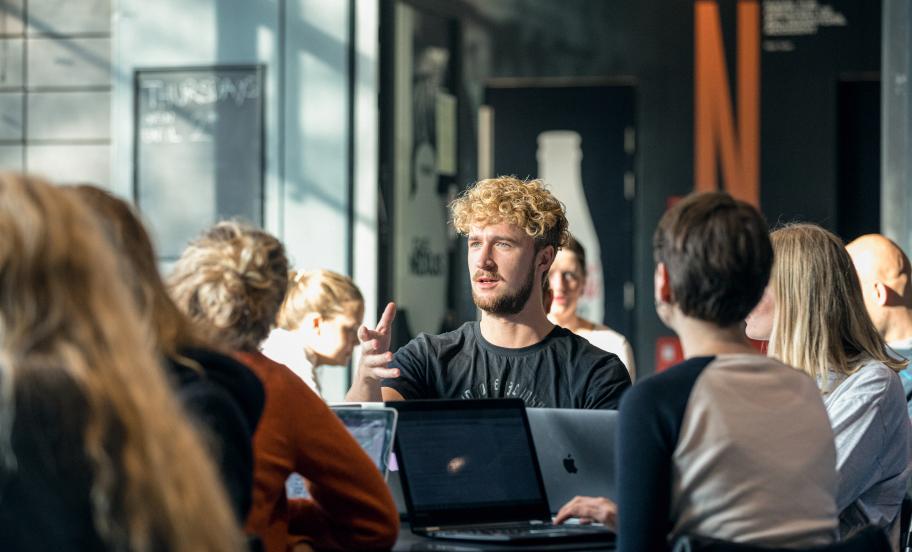
Entry requirements
Admission in numbers
Entry requirements
You are qualified for admission to the study programme if you fulfil the following requirements.
Please note that fulfilling the requirements does not guarantee you a study place.
1. Bachelor degree
2. Language requirement
3. Academic requirements
1. Bachelor degree
You must hold a bachelor degree to fulfil the general requirement for admission to CBS’ master programmes. You must have completed your bachelor degree before study start.
Legal claim
No applicants have a legal right of admission to this programme as it is not the natural progression for any bachelor degree.
Have you not yet completed your bachelor degree?
You can apply for admission even if you have not yet completed your bachelor’s degree. However, you must finish it before study start. If you are offered a place, you will be conditionally admitted, which means:
- You must complete your bachelor’s degree before you can begin your studies at CBS.
- You must upload your bachelor diploma and transcript no later than 31 August.
2. Language requirement
English level A (Panel content)
The language requirement
The language requirement is English at Danish level A.
Documentation deadline
You must fulfil and document the language requirement before the application deadline.
Check if you fulfil the language requirement
Use the tabs above to find out how you can document English level A. Each tab shows an approved way to fulfil the requirement, depending on your background.
We only accept the qualifications and documents listed on this page.
Danish upper secondary exam (Panel content)
Required courses and levels
Danish upper secondary exam or
If you have passed English level A from an upper secondary school in Denmark (ie. stx, hhx, htx, hf) you fulfil this requirement.
English level A must be passed with a minimum grade point average of 2.0.
Supplementary upper secondary courses
English A as a single subject via secondary school supplementation (Gymnasialt suppleringskursus (GSK)) or as a Higher Preparation Examination single subject (HF-enkeltfag).
English level A must be passed with a minimum grade point average of 2.0.
Individual competency assessment (IKV)
If you think you have language competences corresponding to an English level A, you have the possibility to request an assessment - Individuel Kompetencevurdering (IKV) from a Danish VUC (adult education centre).
Required documentation
Danish upper secondary exam or supplementary upper secondary courses
Upper secondary (ie. stx, hhx, htx, hf) certificate:
- a scan/photo of the original, stamped and signed hard copy or
- a digitally signed certificate downloaded from Min Kompetencemappe
Individual competency assessment (IKV)
Official IKV assessment
Other upper secondary exams (Panel content)
Find your country
Austria
Required courses and levels
Minimum total sum of 11 weekly lessons over years 10, 11 and 12 and Erste lebende Fremdsprache and Wahlpflichtgegenstände in English language. Subjects that are taught in English even as Wahlpflichtgegenstände do not count.
Required documentation
Reifeprüfung diploma certificate including Stundentafel covering (min.) 4 years of the Oberstufe OR
Reife- und Diplomprüfung diploma certificate including Stundentafel covering (min.) 5 years of the Oberstufe.
International Baccalaureate (IB)
Required courses and levels
- English A1, higher level
- English A2, higher level
- English B, higher level
- English A1, standard level
- English A2, standard level
- English A Language and Literature, higher level
- English A Language and Literature, standard level
- English A Literature, higher level
- English A Literature, standard level
Required documentation
Official IB diploma and/or transcript. Alternatively, you can give CBS access to your results via IBO.org.
European Baccalaureate (EB)
Required courses and levels
• L I
• L II
• L III – 6 years (documentation for 6 years must be included)
Required documentation
Official EB diploma and/or transcript
Australia
Required courses and levels
A complete upper secondary education from Australia, where the majority of the education has been taught in English, fulfils the English A language requirement.
Required documentation
Senior Secondary Certificate of Education (SSCE) as well as Statement of Result or Record of Achievement or Qualifications Certificate, covering subjects and grades during the last two years of the secondary education.
Bulgaria
Required courses and levels
English as first foreign language (556 number of classes) AND English Intense Study (648 number of classes)
Required documentation
- Diploma za (Zavarsheno) Sredno Obrazovanie / za Sredno Obrazovanie and
- Grade transcript for Years 10, 11 and 12
Canada
Required courses and levels
A complete upper secondary education from Canada, where the majority of the education has been taught in English, fulfils the English A language requirement.
Required documentation
High School Diploma / Graduation Diploma (or equivalent for your province) as well as Transcript of grades / High School Results (or equivalent for your province)
England, Wales, Northern Ireland
Required courses and levels
- A complete upper secondary education taught in England, Wales or Northern Ireland or
- A level English Language or
- A level English Literature
Required documentation
- GCSE certificate(s) (with a min. of 6 subjects) as well as A-level (Advanced level) certificate(s) (with a min. of 3 subjects) both taken in the UK or
- Official A level certificate for either English Language or English Literature
Germany
Required qualifications
English passed (5 points or higher) as a higher level course (either erhöhtes Anforderungsniveau or Leistungskurs) in both the Qualifikationsphase (half-year results) and the Abiturprüfung (Prüfungsfach) as part of the Abitur.
Courses marked erhöhtes Anforderungsniveau or Leistungskurs may be designated in a number of different ways such as:
- L or LK or Leistungskurs
- P or Profilfach
- K or Kernfach
- eA or erhöhtes Anforderungsniveau
- E and designated as erhöhtes Anforderungsniveau in the certificate legend
- HF or Hauptfach
- PF or Profilfach
- Highlighted in grey and and designated as Leistungsfächer in the certificate legend
For applicants with a Waldorfschule/Rudolf Steiner Schule Abitur or Deutsche Internationale Abitur/prüfung (DIA/DIAP) please contact graduateadmission@cbs.dk for more information
Required documentation
All pages of your Zeugnis der Allgemeinen Hochschulreife (Abiturzeugnis): cover, diploma and report card for all 4 half-years showing the Qualifikationsphase as well as the Abiturprüfung
Iceland
Required qualifications
For upper secondary studies completed according to the 2008 reform:
Minimum 25 Fein (new credits) obtained in English; of these, minimum 15 Fein must be at Þrep (qualification level) 3 or higher
For upper secondary studies completed according to the 1999 reform:
- Minimum 18 einingar (old credits) obtained in English; minimum one English subject must be at level 6 or higher (e.g. ENS 603)
Required documentation
Official transcript (in Icelandic) for Stúdentspróf
NB: Letters issued by the institution that do not list the names, module codes, grades and codes/points for all the passed courses are not accepted.
Ireland
Required qualifications
A complete upper secondary education from Ireland, where the majority of the education has been taught in English, fulfils the English A language requirement.
Required documentation
The Established Leaving Certificate Examination (Leaving Cert) with a min. of 6 subjects total
Malta
Required qualifications
A level
Required documentation
Matriculation Certificate and Advanced Level Certificate og Intermediate Level Certificate
New Zealand
Required qualifications
A complete upper secondary education from New Zealand, where the majority of the education has been taught in English, fulfils the English A language requirement.
Required documentation
National Certificate of Education Achievement (NCEA) levels 1 and 2 and 3
Norway
Required qualifications
The following combinations from the Norwegian upper secondary education courses must be passed:
VG3 SPR3010 & SPR3011
or
VG3 SPR3012 & SPR3013
or
VG SPR3031 & SPR3032
Required documentation
Official transcript for the Vitnemål for videregående opplæring
Scotland
Required qualifications
A complete upper secondary education from Scotland, where the majority of the education has been taught in English, fulfils the English A language requirement.
Required documentation
Scottish Qualification Certificate as well as Summary of Attainment, Detail Record of Attainment and Profiles
Singapore
Required qualifications
A complete upper secondary education from Singapore, where the majority of the education has been taught in English, fulfils the English A language requirement.
Required documentation
Singapore-Cambridge GCE A-level exam certificate with a min. of 4 (H1, H2 and H3) exams total, as well as General Paper and Project Work
South Africa
Required qualifications
A complete upper secondary education from South Africa, where the majority of the education has been taught in English, fulfils the English A language requirement.
Required documentation
National Senior Certificate (Matric/Matriculation Certificate) as well as grade transcript covering subjects and grades during all three years of studies
United States
Required qualifications
A complete upper secondary education from the United States, where the majority of the education has been taught in English, fulfils the English A language requirement.
Required documentation
High School Diploma as well as High School Grade transcript (covering all four years’ worth of subjects and grades) taken in the US.
Language tests (Panel content)
Language tests
TOEFL
TOEFL internet-based test (iBT)
A TOEFL iBT test result of at least 94 with minimum 20 in each discipline is required.
Your scores are only valid if they are no more than two years old by the application deadline and have been shared with CBS.
TOEFL iBT Home Edition is accepted.
MyBest scores are not accepted.
Required documentation
Your TOEFL scores will be verified in the TOEFL database. You must list Copenhagen Business School as one of your score recipients when you sign up for the TOEFL test, or order a score sheet for Copenhagen Business School if you have already taken the test. The TOEFL institution code for CBS is 7035.
You must upload either your digital copy, or a scan of your hard copy, TOEFL score sheet to the Application Portal.
IELTS
IELTS Academic test
An IELTS academic test result of at least 7.0 with minimum 6.0 in each discipline is required.
IELTS test results that are more than two years old by the application deadline are not accepted.
IELTS Online is accepted.
IELTS One Skill Retake scores are not accepted.
Required documentation
Your IELTS results will be verified in the IELTS database. Please instruct your test centre to make your results available to Copenhagen Business School, either when you book your IELTS test or after the test date.
You must also upload a scan of your IELTS test report form to the Application Portal. If you have not received the physical test report form, you can upload a document with the "Test Report Form Number" (TRF Number) so we can verify your scores.
Cambridge
Cambridge C2 or C1 examination
A Cambridge C2 Proficiency (Certificate of Proficiency in English) passed with min. C, corresponding to a score of minimum 200, or a Cambridge C1 Advanced (Certificate of Advanced English) passed with minimum C AND a score of minimum 185 is required.
Required documentation
You must upload your Cambridge C2 Proficiency (CPE) or Cambridge C1 Advanced (CAE) Statement of Results and/or Certificate.
Your results are only valid if they can be verified through the Candidate Results Website. Make sure to register for the service and share your results with Copenhagen Business School. There is no expiration date on the validity of the CPE/CAE exam results.
CBS bachelor degree (Panel content)
English-taught bachelor degree from CBS
Applicants with an English-taught bachelor degree from CBS who continue their studies in English at master level have already had their qualifications checked and do not need to upload additional documents.
Danish-taught bachelor degree from CBS
If you have a Danish-taught bachelor degree from CBS, you must document that you fulfil English A. We did not check your English A qualifications when you applied for your bachelor degree, as it was not a requirement for a Danish-taught programme.
3. Academic requirements
Academic requirements
You must fulfil the academic requirements before study start.
The academic requirements are a total of 90 ECTS-points comprising of:
45 ECTS-points in the following core academic areas, with a minimum of 5 ECTS-points within each:
- Microeconomics
- Organisation
- Marketing
- Quantitative Methods/Statistics
- Accounting
- Finance
and
45 ECTS-points in Business Administration and/or Economics
Examples of topics that fulfil the academic requirements
Examples
Organisation: Organisational Design, Organisational Structure, Organisational Behaviour, Human Resource Management, Personnel Management, and the like.
NB! Topics within Industrial Organisation are not included in this area
Microeconomics: Utility, Demand, Supply & Equilibrium, Measurement of Elasticities, Consumer Demand Theory, Market Structures and Market Failure.
NB! Topics within Macroeconomics are not included in this area.
Marketing: Marketing Theory, Marketing Management, Branding, Brand Management, and the like.
Quantitative Methods/Statistics: Statistics, Econometrics, Quantitative Methods, and the like.
Accounting: Financial Accounting, Management Accounting, Auditing, Tax Accounting, Controlling, Bookkeeping, and the like.
Finance: Corporate Finance, Investment Analysis, Portfolio Theory and Management, Asset Pricing, Capital Budgeting, Derivatives, Financial Risk Management
NB! Topics within International Economics, Financial Economics and Macroeconomics are not included in this area.
Business Administration: Organisation, Marketing, Quantitative Methods/Statistics, Accounting, Finance, as well as Strategy, Innovation, Supply Chain Management, General Management, and the like.
Economics: Microeconomics, Managerial Economics, Industrial Economics, Macroeconomics, International Economics, and the like.
Check if you fulfil the academic requirements
Advance assessment (Panel content)
Check the advance assessments
CBS Admissions cannot make a pre-assessment of your individual qualifications before you apply for admission.
Find your bachelor programme
Instead, we have assessed a number of bachelor programmes. In these so-called advance assessments, you can see whether your bachelor degree fulfils the academic entry requirements.
An advance assessment shows whether the obligatory courses in your bachelor programme fulfil the academic requirements for a master programme at CBS.
We typically prepare an advance assessment when many applicants from the same bachelor programme apply for the same master programme.
You can find them by clicking on the tabs above.
Missing courses?
If you are missing courses, you may be able to fulfil the requirements through relevant elective courses or supplementary courses.
See what to do if you are missing courses to fulfil the adacemic requirements
No advance assessment?
If your bachelor programme is not listed under the tabs above, you can make your own assessment of to what extent you meet the entry requirements through the courses you have taken in your bachelor programme and any supplementary courses.
Use the form below.
CBS (Panel content)
Qualifying bachelor degrees
If you have on of the following bachelor degrees you fulfil the academic requirements for 2026:
BSc in Business Administration and Service Management
Enrolled all years
BSc in International Business
Enrolled all years
BSc in International Business – Globe 2.0 /TREBLE
Enrolled in 2023
BSc in International Shipping and Trade
Enrolled all years
BSc in International Shipping and Trade – Global Supply Chain and Logistics Management (SCLM)
Enrolled in 2023
HA almen erhvervsøkonomi
Enrolled all years
HA i europæisk business (HA EB)
Enrolled all years
HA i projektledelse
Enrolled all years
HD 2.del
Enrolled all years
HA(jur.) - erhvervsøkonomi og erhvervsjura
Enrolled in 2022 or 2023
HA(mat.)
Enrolled in 2023
For enrolment in 2022, find the Advance assessment under 'Potentially qualifying Bachelor Degrees'.
BSc in Business Administration and Digital Management
Enrolled in 2022 or 2023
BSc in Business Administration and Sociology
Enrolled in 2022 or 2023
BSc in International Business in Asia (IBA)
Enrolled in 2021 or 2022
HA(psyk.) - erhvervsøkonomi og psykologi
Enrolled in 2022 or 2023
HA(fil.) - erhvervsøkonomi og filosofi
Enrolled in 2022 or 2023
Potentially qualifying bachelor degrees
Check to see which academic areas you are missing in order to fulfil the academic requirements in 2026:
BSc in Business, Language and Culture
Enrolled in 2022 or 2023
- 5 ECTS-points in Marketing
BSc in International Business and Politics
Enrolled in 2022 or 2023
- 5 ECTS-points in Marketing
HA(it.) - erhvervsøkonomi og informationsteknologi
Enrolled in 2022 or 2023
- 5 ECTS-points in Quantitative Methods/Statistics
- 5 ECTS-points in Marketing
HA(kom.) - erhvervsøkonomi og virksomhedskommunikation
Enrolled in 2022 or 2023
- 5 ECTS-points in Accounting
HA(mat.) - erhvervsøkonomi og matematik
Enrolled in 2022
- 5 ECTS-points in Accounting
HA i markeds- og kulturanalyse (MAK)
Enrolled in 2022 or 2023
- 5 ECTS-points in Organisation
- 5 ECTS-points in Finance
Denmark (Panel content)
Qualifying bachelor degrees
If you have on of the following bachelor degrees you fulfil the academic requirements for 2026:
AU - BSc in Economics and Business Administration
Including applicants enrolled in a credit programme under BSc in Economics and Business Administration
Enrolled in 2022 or 2023
AU - HA erhvervsøkonomi
(regardless of specialisation)
Including applicants enrolled in a credit programme under HA
Enrolled in 2022 or 2023
AU - HA(jur.)
Enrolled in 2022 or 2023
AAU - BSc in Economics and Business Administration
includes applicants enrolled in a credit programme under BSc in Economics and Business Administration
Enrolled in 2022 or 2023
AAU - HA erhvervsøkonomi
Includes applicants enrolled in a credit programme under HA
Enrolled in 2022 or 2023
SDU - BSc in Economics and Business Administration
Regardless of specialisation
Including applicants enrolled in a credit programme under BSc in Economics and Business Administration
Enrolled in 2022 or 2023
SDU - HA erhvervsøkonomi
Regardless of specialisation
Including applicants enrolled in a credit programme under HA
Enrolled in 2022 or 2023
SDU - BSc in International Business Administration and Foreign Languages/BSc i international erhvervsøkonomi med fremmedsprog
Enrolled in 2022 or 2023
RUC - BSc in Business Administration from RUC
Including applicants enrolled in a credit programme under BSc in Business Administration
Enrolled in 2022 or 2023
RUC - Samfundsvidenskabelig bachelor + Erhvervsøkonomi (HA) single subject
Including applicants enrolled in a credit programme under HA
Enrolled in 2022 or 2023
RUC - International Bachelor in Social Sciences + Business Administration (single subject)
Including applicants enrolled in a credit programme under Business Administration
Enrolled in 2022 or 2023
HD 2.del (regardless of institution)
Regardless of your year of enrolment
Potentially qualifying bachelor degrees
Check to see which academic areas you are missing in order to fulfil the academic entry requirements in 2026:
SDU - BA i erhvervsøkonomi - erhvervssprog, negot., with English or German
Enrolled in 2022 or 2023
- 5 ECTS-points in Accounting
- 5 ECTS-points in Finance
- An additional 5 ECTS-points in one or more of the following areas: Microeconomics, Organisation, Marketing, Statistics/Quantitative Methods, Accounting, Finance
SDU BSc in Market and Management Anthropology
Enrolled in 2022 or 2023
- An additional 15 ECTS-points in one or more of the following areas: Microeconomics, Organisation, Marketing, Statistics/Quantitative Methods, Accounting, Finance
Non-qualifying bachelor degrees
Your obligatory courses do not fulfil the academic requirements and it is unlikely that elective courses and/or taking supplementary courses will help you to fulfil the requirements in full.
Professional bachelor degree in International Sales & Marketing (top-up) (regardless of institution)
Applicants enrolled in 2022 or 2023 do not fulfil the following academic requirements:
- 5 ECTS-points in Microeconomics
- 5 ECTS-points in Organisation
- 5 ECTS-points in Marketing
- 5 ECTS-points in Quantitative Methods/Statistics
- 5 ECTS-points in Accounting
- 5 ECTS-points in Finance
- An additional 15 ECTS-points in one or more of the above areas
Applicants enrolled in 2024 do not fulfil the following academic requirements:
- 5 ECTS-points in Microeconomics
- 5 ECTS-points in Organisation
- 5 ECTS-points in Marketing
- 5 ECTS-points in Quantitative Methods/Statistics
- 5 ECTS-points in Accounting
- 5 ECTS-points in Finance
- An additional 20 ECTS-points in one or more of the above areas
Professional bachelor in Leisure Management (regardless of institution)
Applicants enrolled in 2022 or 2023 do not fulfil the following academic requirements:
5 ECTS-points in Microeconomics
5 ECTS-points in Organisation
5 ECTS-points in Marketing
5 ECTS-points in Quantitative Methods/Statistics
5 ECTS-points in Accounting
5 ECTS-points in Finance
An additional 15 ECTS-points in one or more of the above areas
Professionsbachelor i Finans (regardless of institution)
Applicants enrolled in 2022 or 2023 do not fulfil the following academic requirements:
- 5 ECTS-points in Microeconomics
- 5 ECTS-points in Organisation
- 5 ECTS-points in Marketing
- 5 ECTS-points in Quantitative Methods/Statistics
- 5 ECTS-points in Accounting
- 5 ECTS-points in Finance
- An additional 15 ECTS-points in one or more of the above areas
The following electives may be used to cover the above:
- "Finansielle forretninger og rådgivning A+B" fulfil 5 ECTS-points in Finance
- "Økonomistyring A (Ekstern Regnskab) + Økonomistyring B (Strategisk Økonomistyring)" fulfil 5 ECTS-points Accounting
Austria (Panel content)
Qualifying bachelor degrees
We have not made standard assessment for a bachelor degree from Austria, that directly qualify for a master programme.
Potentially qualifying bachelor degrees
Check to see which academic areas you are missing in order to fulfil the academic entry requirements in 2026:
Bachelor in Business and Economics (BBE) - Vienna University of Economics and Business (WU)
Enrolled in 2022 or 2023
- 5 ECTS-points in Marketing
- 5 ECTS-points in Finance
All obligatory courses have been taken into consideration. Electives, free electives, courses included in specialisations or courses completed as part of double degree programme with QUT have not been included - please provide official course descriptions (taken from eVVZ or issued by QUT) when you apply.
Germany (Panel content)
Qualifying bachelor degrees
If you have the following bachelor degree you fulfil the academic entry requirements for 2026:
University of Mannheim - Bachelor of Business Administration/ Betriebswirtschaftslehre
Enrolled in 2022 or 2023
Potentially qualifying bachelor degrees
Check to see which academic areas you are missing in order to fulfil the academic requirements in 2026:
Ludwig-Maximilian University of Munich (LMU) - BA in Business Administration/ Betriebswirtschaftslehre
Applicants enrolled in 2022 or 2023 do not fulfil the following academic requirements:
- 1.5 ECTS-points in Marketing
Ludwig-Maximilian University of Munich (LMU) - BA in Economics/ Wirtschaftswissenschaft
Enrolled in 2022 or 2023
- 5 ECTS-points in Organisation
- 5 ECTS-points in Marketing
- 5 ECTS-points in Accounting
- 5 ECTS-points in Finance
Please document relevant electives with official course descriptions.
University of Münster (WWU) - BA in Business Administration/ Betriebswirtschaftslehre
Applicants enrolled in 2022 or 2023 do not fulfil the following academic requirements:
- 1.5 ECTS-points in Organisation
If you received transfer credit for one or more obligatory courses (or if you switched PO), the above may not apply. Please document relevant courses with official course descriptions.
University of Münster (WWU) - BA in Economics/ Volkswirtschaftslehre
Applicants enrolled in 2022 or 2023 do not fulfil the following academic requirements:
- 5 ECTS-points in Organisation
- 5 ECTS-points in Marketing
- 5 ECTS-point in Accounting
If you received transfer credit for one or more obligatory courses (or if you switched PO), the above may not apply. Please document relevant courses with official course descriptions.
Goethe University Frankfurt - BA in Economics and Business Administration/ Wirtschaftswissenschaften
Applicants enrolled in 2022 and 2023 do not fulfil the following academic requirements:
- 3 ECTS-points in Organisation
The above may be covered if you have studied Management as Schwerpunkt (PO 2022).
If you received transfer credit for one or more obligatory courses (or if you switched PO), the above may not apply. Please document relevant courses with official course descriptions.
Transcripts from the orientierung- as well as the qualifizierungabschnitt must be provided.
Iceland (Panel content)
Qualifying bachelor degrees
If you have on of the following bachelor degrees you fulfil the academic requirements for 2026:
Reykjavik University - Bachelor degree in Business Administration
Only student with no specialisation, or with specialisation in Computer Science, or Law
Enrolled in 2022 or 2023
University of Iceland - Bachelor degree in Business Administration
Only students with a specialisation in Marketing, Finance, Accounting or Management
Enrolled in 2022 or 2023
Potentially qualifying bachelor degrees
Check to see which academic areas you are missing in order to fulfil the academic entry requirements in 2026:
University of Iceland - Bachelor degree in Economics
Enrolled in 2022 or 2023
- 5 ECTS-points in Organisation
- 5 ECTS-points in Marketing
Italy (Panel content)
Qualifying bachelor degrees
If you have on of the following bachelor degrees you fulfil the academic entry requirements for 2026.
Please note that in case of a credit transfer of obligatory courses, we reserve the right not to use the advance assessments below.
Bocconi University - Bachelor of Economics and Management for Arts, Culture and Communication (CLEACC)
Enrolled in 2022 or 2023
Bocconi University - Bachelor of Business Administration and Management (CLEAM)
Enrolled in 2022 or 2023
University of Bologna - Bachelor in Business and Economics (taught in English) (CLABE)
Enrolled in 2022 or 2023
University of Bologna - Bachelor in Management and Marketing/ Management e marketing (taught in Italian)
Enrolled in 2022 or 2023
Universita Cattolica del Sacro Cuore - Bachelor in Economics and Management (taught in English), curriculum: Management
Enrolled in 2022 or 2023
Bachelor in Economics and Management/ Economia e gestione aziendale (taught in Italian), curriculum: Management from Universita Cattolica del Sacro Cuore
Enrolled in 2022 or 2023
Potentially qualifying bachelor degrees
Check to see which academic areas you are missing in order to fulfil the academic entry requirements in 2026.
Please note that in case of a credit transfer of obligatory courses, we reserve the right not to use the advance assessments below.
Bocconi University - Bachelor of Economics and Finance (CLEF)
Enrolled in 2022 or 2023
- 5 ECTS-points in Organisation
- 5 ECTS-points in Marketing
Bocconi University - Bachelor of Science in International Economics and Management (BIEM)
Enrolled in 2022 or 2023
- 5 ECTS-points in Organisation
- 5 ECTS-points in Marketing
Organisation can be fulfilled if you choose the course "Organization Theory" as one of your third year major compulsory courses. It must be passed at Bocconi University and not on exchange.
Marketing can be fulfilled if you choose "Marketing" as one of your third year major compulsory courses. It must be passed at Bocconi University and not on exchange.
University of Bologna - Bachelor in Economics and Finance (taught in English)
Enrolled in 2022 or 2023
- 5 ECTS-points in Organisation
- 5 ECTS-points in Marketing
Netherlands (Panel content)
Qualifying bachelor degrees
If you have the following bachelor degree you fulfil the academic entry requirements for 2026:
Maastricht University Bachelor degree in International Business, no specialisation
Enrolled in 2022 or 2023
Potentially qualifying bachelor degrees
Check to see which academic areas you are missing in order to fulfil the academic requirements in 2026:
Erasmus Rotterdam University, RSM - International Business Administration (IBA)
Enrolled in 2022 or 2023
- 1 ECTS-point in Marketing
Norway (Panel content)
Qualifying bachelor degrees
If you have on of the following bachelor degrees you fulfil the academic entry requirements for 2026:
BI Handelshøyskolen - Bachelor in Business Administration (in English)
Enrolled in 2022 or 2023
BI Handelshøyskolen - Bachelor i Finans
Enrolled in 2022 or 2023
BI Handelshøyskolen - Bachelor degree i Økonomi og Ledelse
Enrolled in 2022 or 2023
BI Handelshøyskolen - Bachelor i Økonomi og Administrasjon
Enrolled in 2022 or 2023
BI Handelshøyskolen - Bachelor i Forretningsjus og Økonomi
Enrolled in 2022 (For enrolment in 2023, find the Advance assessment under 'Potentially qualifying Bachelor Degrees)'.
BI Handelshøyskolen - Bachelor of Data Science
Enrolled in 2022 or 2023
University of Agder - Bachelor i Økonomi og Administrasjon
Enrolled in 2022 or 2023
NHH - Bachelor i Økonomi og Administrasjon
Enrolled in 2022 or 2023
NTNU - Bachelor i Økonomi og Administrasjon
Enrolled in 2022 or 2023
Please note that applicants from BI Handelshøyskolen must specify the exact name of their bachelor programme in the application, if this is not written in the grade transcript.
Potentially qualifying bachelor degrees
Check to see which academic areas you are missing in order to fulfil the academic entry requirements in 2026:
BI Handelshøyskolen - Bachelor i Forretningsjus og Økonomi
Enrolled in 2023
- 5 ECTS-points in Quantitative Methods/Statistics
BI Handelshøyskolen - Bachelor i Markedsføringsledelse
Enrolled in 2022 or 2023
- 2.5 ECTS-points in Finance
- 2.5 ECTS-points in Microeconomics
BI Handelshøyskolen - Bachelor i Organisasjonspsykologi, HR og ledelse
Enrolled in 2022
- 2.5 ECTS-points in Finance
- 2.5 ECTS-points in Microeconomics
Enrolled in 2023
2.5 ECTS-points in Finance
BI Handelshøyskolen - Bachelor i International management
Enrolled in 2022 or 2023
- 2.5 ECTS-points in Finance
- 2.5 ECTS-points in Microeconomics
BI Handelshøyskolen - Bachelor i Digital kommunikasjon og markedsføring
Enrolled in 2022 or 2023
- 2.5 ECTS-points in Finance
- 2.5 ECTS-points in Microeconomics
Please note that applicants from BI Handelshøyskolen must specify the exact name of their bachelor programme in the application, if this is not written in the grade transcript.
Sweden (Panel content)
Qualifying bachelor degrees
If you have on of the following bachelor degrees you fulfil the academic requirements for 2026.
Please note that in case of a credit transfer of obligatory courses, we reserve the right not to use the advance assessments above.
Jönköping International Business School - Bachelor degree in International Management
Enrolled in 2022 or 2023
Jönköping International Business School - Bachelor degree in Marketing Management
Enrolled in 2022 or 2023
Jönköping International Business School - Civilekonom, företagsekonomisk inriktning
Enrolled in 2022 or 2023
Jönköping International Business School - Sustainable Enterprise Development
Enrolled in 2022 or 2023
Stockholm School of Economics - BSc Program in Business and Economics
Enrolled in 2022 or 2023
Potentially qualifying bachelor degrees
Check to see which academic areas you are missing in order to fulfil the academic entry requirements in 2026.
Please note that in case of a credit transfer of obligatory courses, we reserve the right not to use the advance assessment.
Jönköping International Business School - Bachelor degree in International Economics
Enrolled in 2022 or 2023
- 5 ECTS-points in Marketing
Jönköping University - Civilekonom, nationalekonomisk inriktning
Enrolled in 2022 or 2023
- 5 ECTS-points in Marketing
Lund University - Bachelor degree in Business and Economics (Ekonomie kandidatprogram)
- 2.5 ECTS-points in Finance
If you chose the specialisations "företagsekonomi" or "redovisning och revision", you fulfil the Finance requirement listed above.
If you chose the specialisation "nationalekonomi" and you have studied the courses "Portföljvalsteori" OR "Optionsteori" OR "Finansiell planering och ekonomisk analys", you also fulfil the Finance requirement.
Switzerland (Panel content)
Qualifying bachelor degrees
If you have on of the following bachelor degrees you fulfil the academic entry requirements for 2026:
University of St. Gallen – BA in Business Administration – regardless of specialisation
Enrolled in 2022 or 2023
NB: In case of a credit transfer of obligatory courses, we reserve the right not to use the advance assessment.
Make sure to upload the grade transcript for your entire programme, including the "Assessment Year (BAE)".
Make a self-assessment
What is a self-assessment?
If there is no advance assessment available for your bachelor’s degree, you can make a so-called self-assessment of your educational background.
If there is an advance assessment of your bachelor degree showing that you are missing certain academic areas to fulfil the academic requirements, you can also use the self-assessment to show how you fulfil the missing academic areas.
Your self-assessment is not binding for us, but it can help you prepare your application and give us a better overview of your educational background.
How to make a self-assessment
Start by listing all the undergraduate courses you have taken, or are going to take, as part of your bachelor's degree or in addition to it, and compare them to the programme's academic requirements.
Read your course titles and descriptions carefully. Try to categorise the courses according to the master programme’s academic requirements.
To get an idea of how we assess each course category, you can use the course catalogue to see how we have categorised different CBS elective courses or CBS Summer University courses within each category.
Use the self-assessment form
We have created a form you can use for your self-assessment. The form is a tool to help you match your courses with the academic entry requirements for the programme and see to what extent you fulfil them.
Remember to include
- Courses you have already passed
- Courses you are currently taking
- Courses you expect to pass before study start (e.g. supplementary courses at summer university)
Download and save the self-assessment form
Chance of admission
More applicants than places
This programme has a limited number of study places.
If there are more qualified applicants than available places, we will select the best qualified applicants.
Selection criteria
The selection process at the MSc EBA - Strategy, Organisation and Leadership is based on an overall assessment of applicants’ educational background at undergraduate level, with a focus on
courses and grades within business administration and economics; grades within the academic areas constituting the academic requirements are of particular importance.
Courses and grades within organisation and strategy may also be taken into consideration.
Personal statement
A personal statement is not part of the selection criteria for this programme.
If you upload a personal statement as part of your application, it will not be taken into consideration.
Connection to the Danish Labour Market
Your connection to the Danish labour market will be taken into consideration as part of the selection process. In your application, you will be asked to write a paragraph of no more than 500 characters (including spaces), describing your current circumstances and reflecting on your future career opportunities in Denmark.
Apply for admission
Info meetings about admission
Participate in the admission information meeting where we guide you through the application process and explain quota 1 and 2, language requirements and admission requirements.
Career
What gets you the job?
You will learn to see the big picture, navigate complexity and to approach problems from many different perspectives.
The MSc EBA SOL programme provides you with the following skills:
- Skills for dealing with complex and ambiguous organisational problems and situations
- Skills for redesigning, changing and improving the strategic and organisational resources for leadership
- A basis for creatively constructing, communicating and pursuing strategic vision
- Theoretical skills for positioning phenomena within relevant theories in organisations, strategy and leadership
These qualifications are applicable and relevant in a host of general management, consulting and research jobs. You will have analytical and hands-on insights that allow you to strategically engage in, facilitate and cultivate organisational change.
Competence profile
In the competence profile you can find more information about the various competences you achieve on the programme:
What do you learn on SOL?
Career
Graduates work in various industries such as:
- Management Consultancy
- Public organisations
- Change management
- Human resources and people development
- Organisational development and change management
- Strategy and business development
- Public sector organisations
- International organisations and NGOs
- Technology and digital services
Typical job tasks for graduates:
- Analysing organisational challenges and recommending improvements
- Supporting strategy development and organisational transformation
- Working with change management processes across teams and departments
- Facilitating workshops, meetings and collaborative processes
- Conducting stakeholder analyses and preparing decision material
- Developing initiatives that strengthen leadership, culture and collaboration
- Supporting HR tasks such as talent development and organisational design
- Collecting and interpreting data to guide strategic decisions
Life long learning
We want you, as a student, to continue developing both personally and professionally throughout your life. CBS aims to support you in applying your knowledge in your organisation and company. Our goal is for you to keep expanding your knowledge and skills, to engage actively in organisational and societal development, and to contribute to shaping a sustainable and democratic society.

CBS and your career
With a programme from CBS, you are a step closer to pursue the career you aspire to. We work closely with a wide range of companies in Denmark because we continuously develop our programmes to match the needs of society. Read more about your career options here.
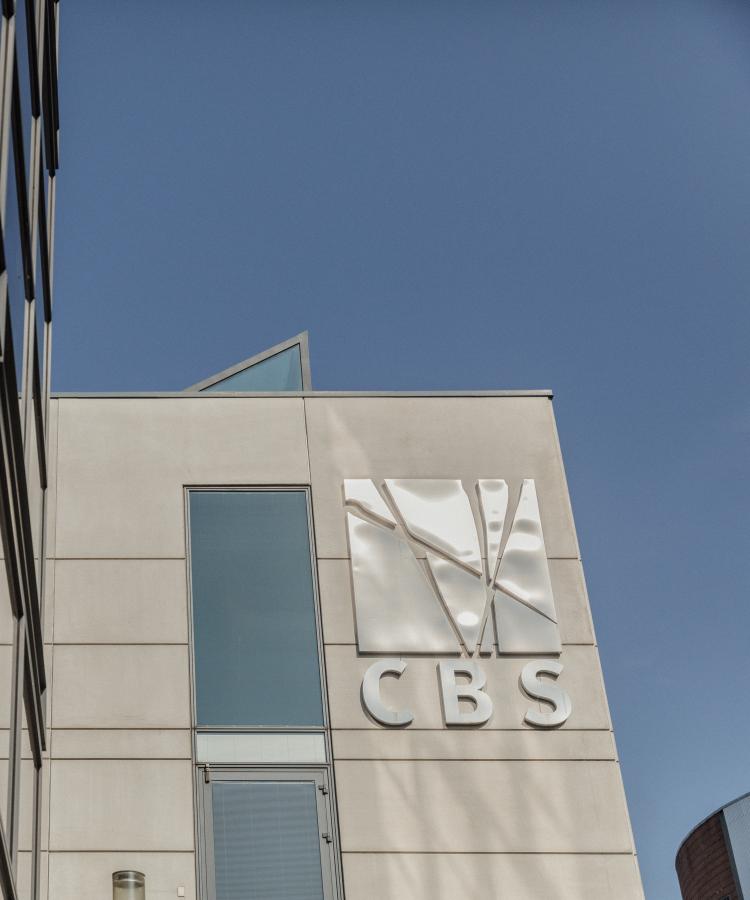
More on MSc in Economics and Business Administration in Strategy, Organisation and Leadership
The MSc EBA SOL programme is about how strategy, organisation and leadership shape businesses and society. You’ll learn to see challenges from multiple perspectives, build strong analytical skills and prepare to lead and innovate in a world of constant change.
Other master programmes
Curious about similar study programmes? You may find other study programmes that also match your interests and dreams for your career.
